Students
Current Students
Kylie Palmer, Ph.D. Candidate, SC CASC Fellow
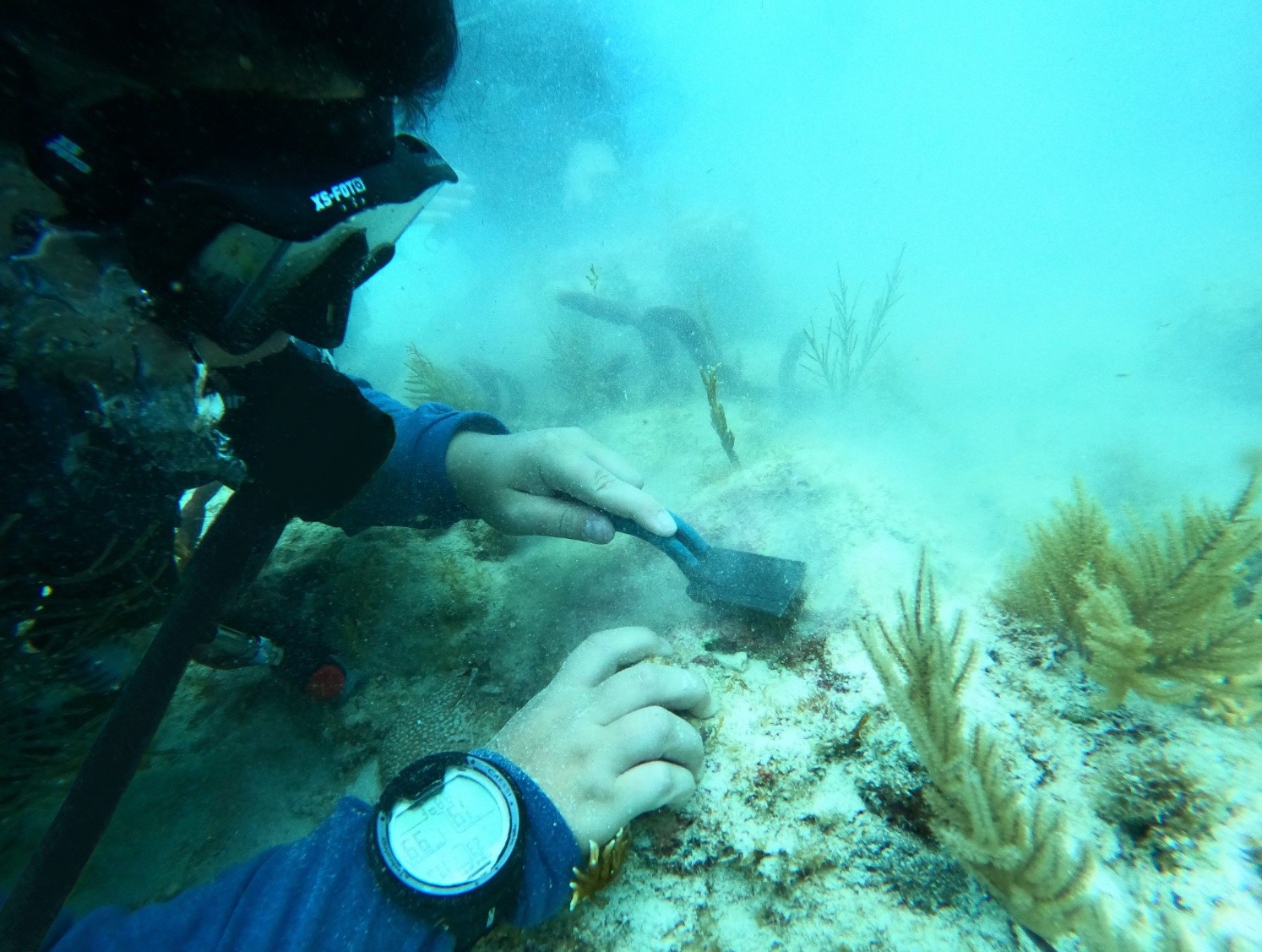
Kylie transplanting coral in the Florida Keys.
Kylie Palmer is a Ph.D. candidate in the PAST lab working on coral-based paleoclimate reconstructions with a variety of geochemical and physical proxies. Her interests include coral reefs, sea level rise, hurricanes, and anthropogenic impacts on coral reef ecosystems. Her past research experiences include practicing conservation paleobiology, by analyzing past environments to help predict and properly manage for future environmental change. Kylie is passionate about marine conservation and doing her part to restore coral reef ecosystems.
Nina Susich, Master's Student
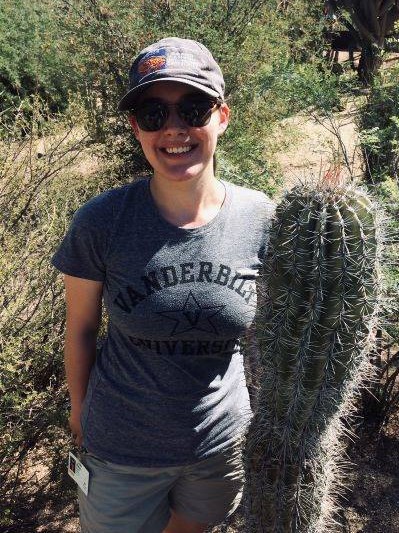
Nina at the Desert Botanical Garden studying columnar cacti.
Nina is a current master's student focusing on coral-based paleoclimate reconstructions using multiple geochemical proxies. For her undergraduate honors research at Vanderbilt University, she identified the taxonomy and analyzed the stable oxygen and carbon isotope ratios of buried mollusk shells from the Bengal Delta in Bangladesh to understand how salinity of local waters had changed throughout the Holocene. Additionally as a Vanderbilt Undergraduate Summer Research Program Recipient, she drilled a Holocene-aged speleothem from Curaçao, Netherlands Antilles and analyzed its stable oxygen and carbon isotopes using an Isotope Ratio Mass Spectrometer (IRMS) to understand major drivers of climate in the southern Caribbean basin. She presented this research at the American Geophysical Union 2021 Fall Meeting. Her interests include coral reef ecosystems, physical oceanography, climate change, and paleoclimatology.
Anna Stebbins, Undergraduate Student
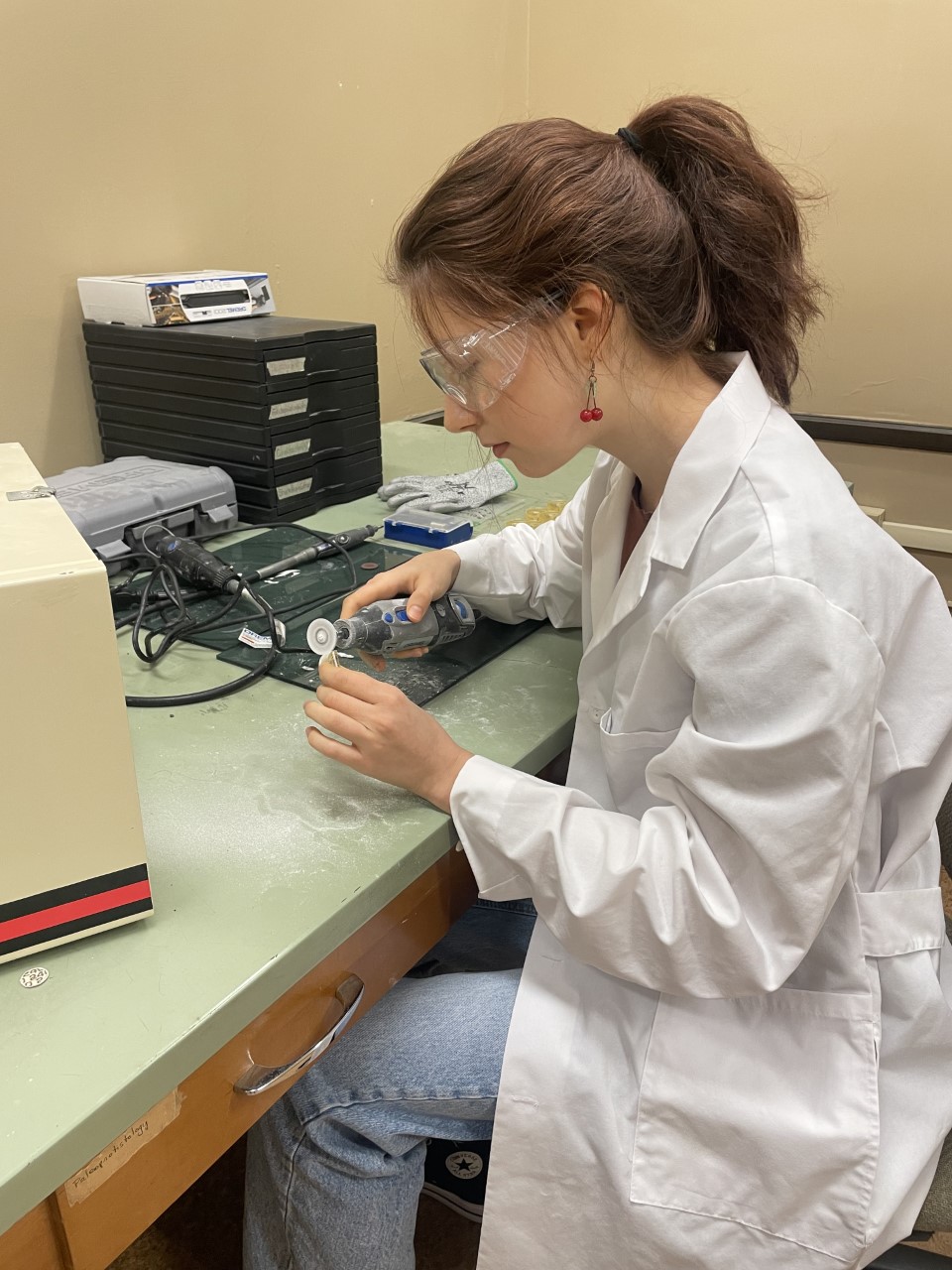
Anna using a dremel tool to cut a shell suspended in epoxy.
Anna is an undergraduate student pursuing dual degrees in Coastal Environmental Science and Anthropology. She is broadly interested in the interfaces of climatology, natural history, resource ecology, and sustainable development particularly in respect to coastal landscapes. A lifelong resident of southern Louisiana, Anna is intimately familiar with the social and environmental ramifications of climate change and environmental disasters. As such, she is particularly interested in projects that could inform how coastal communities and industries might mitigate climate change and adapt to its consequences. Anna has engaged in several projects in the PAST laboratory since joining in the spring of 2021. Initially, she assisted in a study examining the impact of climate conditions on scallop Argopecten purpuratus shell growth. She later developed and executed a project investigating if local eastern oyster (Crassostrea virginica) shells chemically record evidence of freshwater flooding in their inner banding. In doing so, she gained experience obtaining research funding, communicating with oystermen, operating power tools, assessing trace element ratios, and formally presenting her research. Anna’s project was facilitated via the sponsorship of an LSU Discover Undergraduate Research grant and Sigma Xi Grants in Aid of Research funding. She presented her work at several undergraduate and professional meetings and received the highest honor for a poster presentation in her college at the LSU Discover Research Symposium in 2022. Anna is currently working on a project examining bivalve Donax obesulus for the National Science Foundation Paleo Perspectives on Climate Change (“P2C2”) program on reconstructing past climate in Peru.
Gwendal Dolou, Doctoral Student
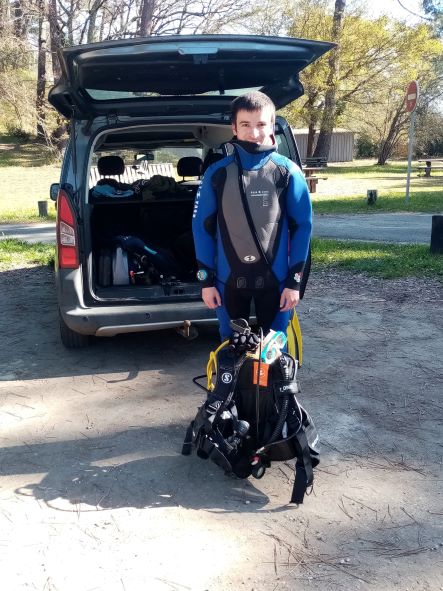
Gwendal preparing to dive in France.
Gwendal was an exchange student in the PAST lab in spring 2022. Originally from France, Gwendal graduated with a master’s in marine sciences at Bordeaux University, France. He obtained a bachelor’s degree in environmental sciences from South Brittany University, France. In the PAST Lab, Gwendal worked on the assessment of a Pseudiploria strigosa coral from Flower Garden Bank with a focus on Sr/Ca, Mg/Ca and Ba/Ca variability. Gwendal is now enrolled at LSU as a Ph.D. student under the supervision of Dr. Kristine DeLong. He is focusing on coral paleoclimate reconstruction using element/Ca variability on modern coral from Flower Garden Bank, Gulf of Mexico and fossil corals from Little Cayman, Caribbean Sea.
Landry Tucker, Undergraduate Student
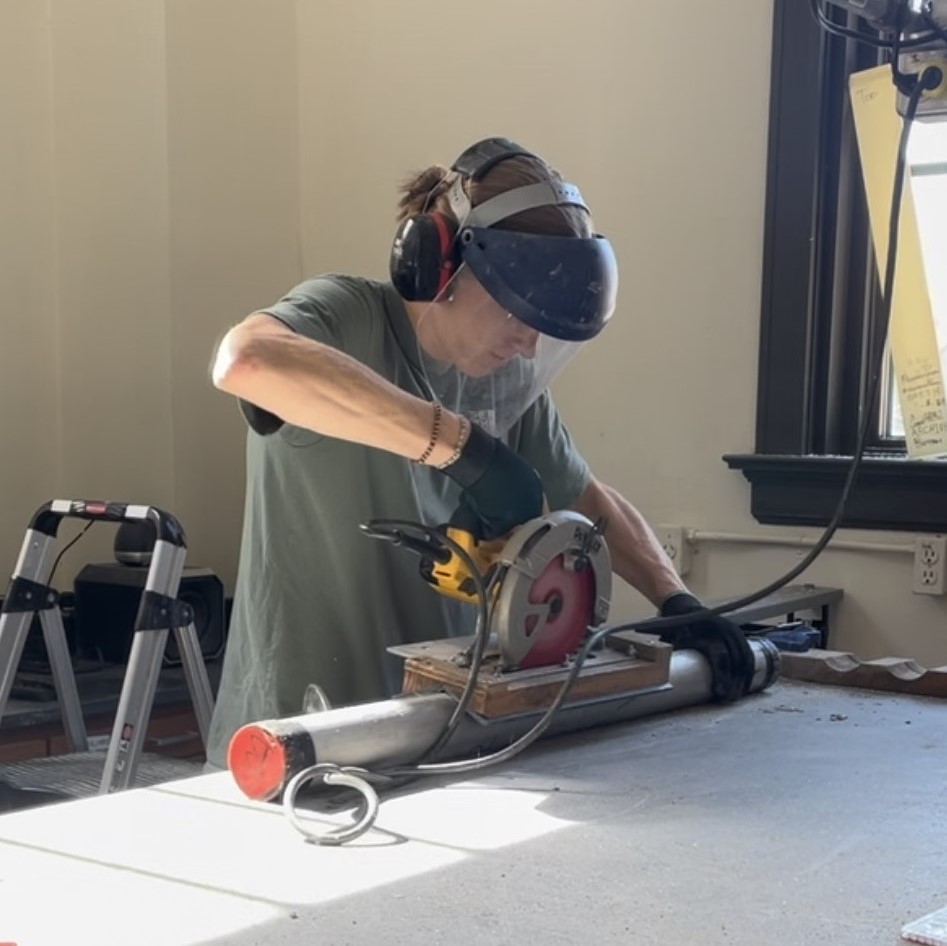
Landry splitting a sediment core collected in the Alabama Underwater Forest.
Landry is an undergraduate student pursuing a degree in Environmental Chemistry with a Coastal and Environmental Science minor. He has conducted previous research as a sophomore in high school at LA Tech with AEOP Program studying the Analysis of Lignin and Extracting Color from Loblolly Pine Needles. Landry joined the Underwater Alabama Forest Project and PAST Lab in 2023 through the Gulf Renaissance Scholars Program, or GRSP, which focuses on sustained research, service and creative endeavors that protect and support local populations, ecosystems and industries, such as fisheries and offshore energy, in and around the Gulf of Mexico.
Alumni
Erika Ornouski, Master's of Science degree, 2023
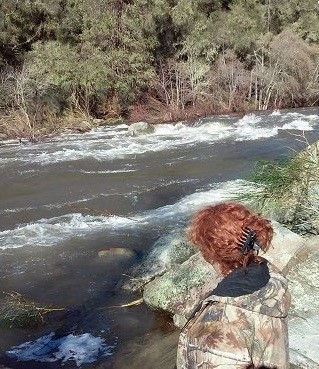
Erika in her natural habitat, hanging out on the Mokelumne River.
Erika’s work in the PAST Lab utilized laser spectroscopy to analyze the stable isotope characteristics of precipitation. A native Californian and self-proclaimed “Pacific baby”, her primary focus was on the climate and water resources of the Southwestern U.S., with an emphasis on the precipitation impacts of West Coast atmospheric river and North American Monsoon storms. Related research interests include heavy rainfall events, flooding, hydrometeorological drought, ocean-atmosphere coupling, boundary layer meteorology (mountain, desert, and coastal), agriculture and water resources, and desert and marine ecology. Erika is also an avid proponent of ocean stewardship and believes that if more money and energy were devoted globally to ocean research, the world would be a happier place. Erika is continuing her research and pursuing her PhD at LSU.
Kendall Brome, Master's of Science degree, 2022
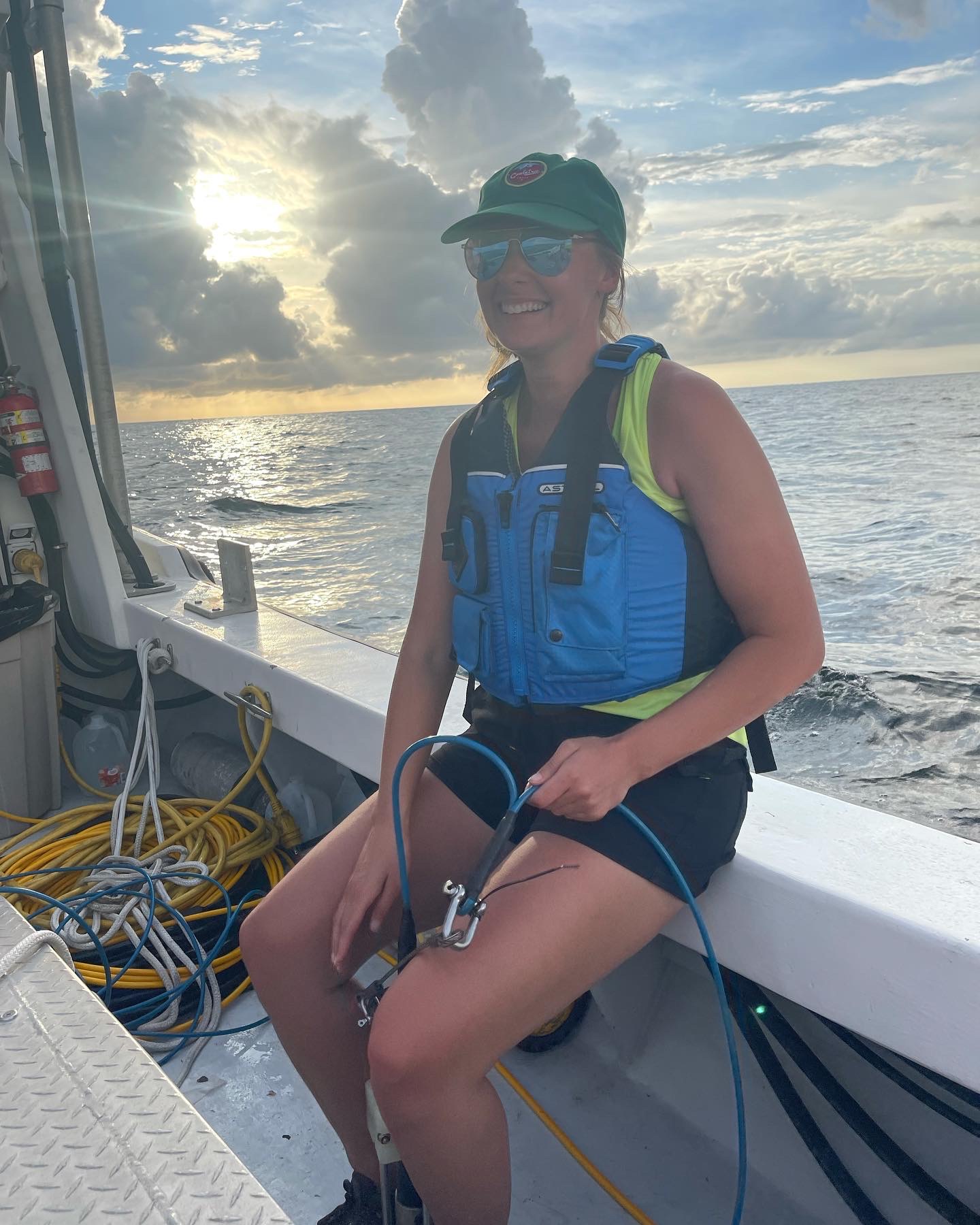
Kendall deploying a sound velocity profiler on a geophysical survey in the Gulf of Mexico.
Kendall first joined the PAST Lab in 2019 through LSU Discover, a program that supports undergraduate research. Through this program, Kendall investigated trace elemental ratios in corals from Little Cayman Island to reconstruct sea surface temperature and presented her project at multiple undergraduate symposiums and at the American Geophysical Union meeting in 2020. Kendall graduated with her Bachelor of Science in Coastal Environmental Science in December 2020 and was awarded two university medals: Distinguished Undergraduate Researcher and Distinguished Communicator. In January 2021, Kendall continued in the PAST Lab as a master's student, with her research shifting to be a multiproxy (stable isotopes and microfossils) assessment of sediment cores from the northern Gulf of Mexico to understand paleoenvironmental evolution that occurred during glacial and deglacial intervals. Through this research, Kendall had the opportunity to join multiple geophysical surveys and vibracoring expeditions in the Gulf of Mexico. The nature of her project was interdisciplinary and collaborative, allowing her opportunities to work in labs at different institutions such as the University of Louisiana at Lafayette School of Geosciences and the University of Southern Mississippi School of Oceans Sciences and Engineering at Stennis Space Center. Kendall defended her thesis in October 2022 and graduated with a Master's of Science degree in December 2022. She now works as a Staff Geologist with Geosyntec Consultants.
Jacob Warner, Ph.D. 2021
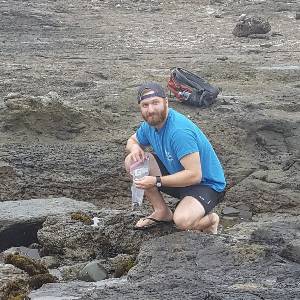
Jacob collecting shells in Peru
Jacob’s research straddles the fields of archaeology and paleoclimatology, focusing on paleoclimate reconstruction and human-environment relationships in the late Holocene. He has 10 years of archaeological field experience in both Peru and Louisiana, and outside of his paleoclimate work, he has been the archaeomalacologist for several field projects in Peru. He is also an amateur naturalist and outdoorsman, having grown up in the Louisiana coastal region. Jacob’s dissertation topic focused on developing Donax obesulus, a short-lived surf clam, as a climate archive in northern coastal Peru. This research has been funded by the National Science Foundation Paleo Perspectives on Climate Change (P2C2) program (award #1805702). The stable oxygen isotope ratios ((δ18O) in D. obesulus can be used as a proxy for sea surface temperature based on a modern analog study and thus reconstruct the El Niño-Southern Oscillation (ENSO) events. By using archaeologically sourced D. obesulus specimens, Jacob's research will help fill in the spatial and temporal gaps in our knowledge of ENSO and its impacts on the northern coast of Peru especially during the Holocene. Preliminary results suggest that ENSO was more variable ~2400 years ago than the mid-Holocene (~5000 years ago), and similar to modern ENSO variability. Jacob is also interested in developing element ratios (Sr/Ca, Mg/Ca, and Ba/Ca) from short-lived bivalves as proxies for environmental signals using inductively coupled plasma optical emission spectrometry (ICP-OES) and laser ablation inductively coupled mass spectrometry (LA-ICP-MS) for Li/Ca and Li/Mg as a complementary proxy to oxygen isotopes and Sr/CA.
Jacob is now an Assistant Professor at the State University of New York Oneota and he plans to expand this research into multiple regions of Peru by developing a network of like-minded archaeomalacologists and paleoclimatologists.
Mudith M. Weerabaddana, Master's of Science degree and Erasmus Mundus scholar, 2020
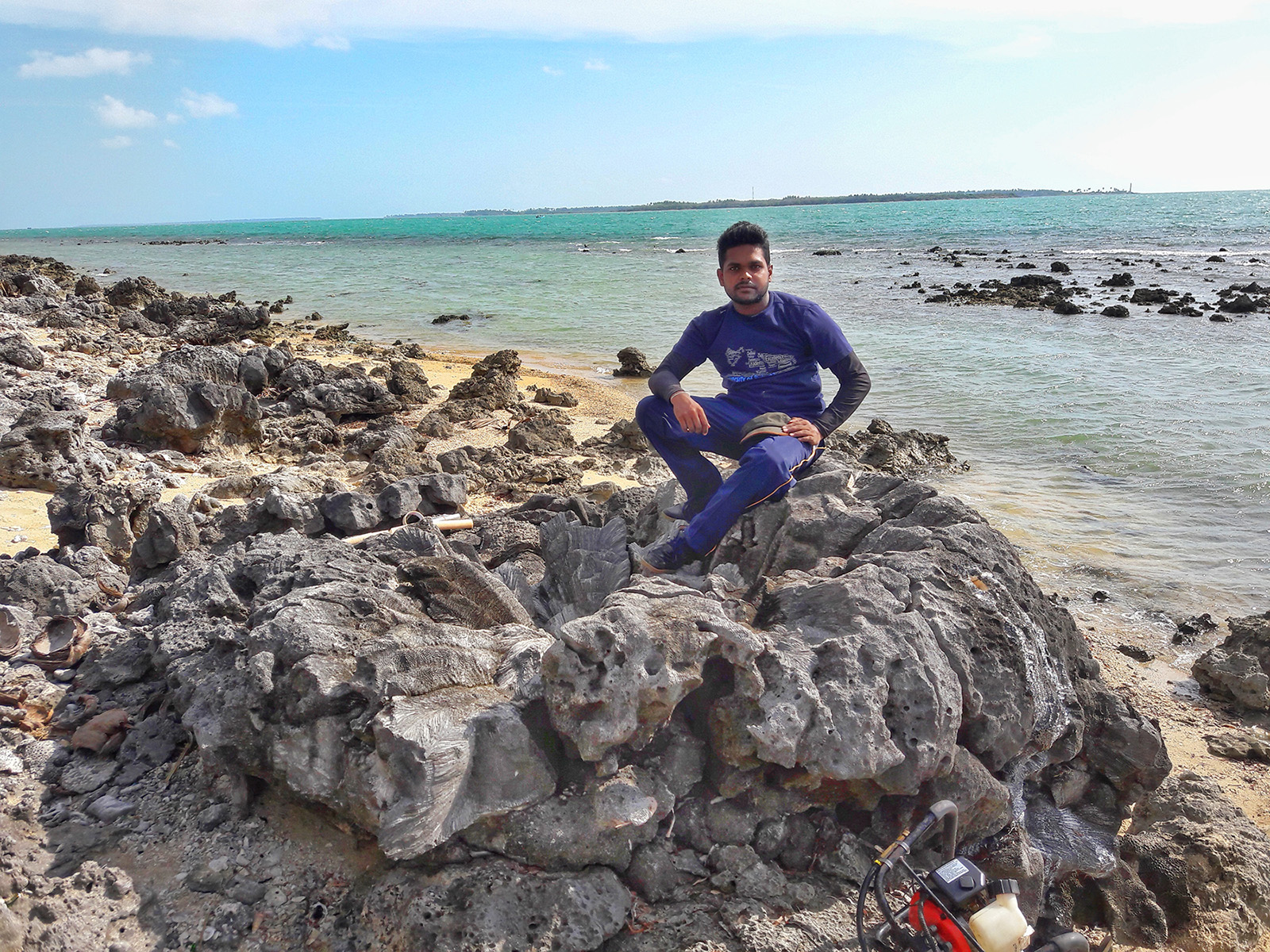
Mudith on a fossil coral in Sri Lanka.
Mudith was a visiting scholar in the PAST lab in 2020. Originally from Sri Lanka, Mudith completed his master's in marine Environment and Resources under Erasmus+ program in Europe as an Erasmus Mundus scholar. He obtained his Bachelor of Science degree in Fisheries and Marine Science with an oceanography and marine geology major from the University of Ruhuna in Sri Lanka. He studied at the University of Southampton (UK), the University of Bordeaux (France) and the University of Basque Country (Spain), and Louisiana State University throughout his master's program. In the PAST lab, Mudith worked on a paleoclimate and paleoceanography reconstructions using a coral from Flower Garden Banks with a focus on coral Ba/Ca variability in the past 75 years in the northwestern Gulf of Mexico. His research aimed to understand barium trends in the northern Gulf and possible connections to oil exploration and productivity. Mudith is continuing his research in paleoenvironmental reconstructions with Diane Thompson at the University of Arizona starting in the fall of 2021.
Clay Tucker, Ph.D. 2020

Clay coring a tree in Mississippi.
Clay is a native of Baton Rouge, Louisiana and enjoys working with anything coastal along the Gulf of Mexico coastline. He has a B.S. and a M.S. in Geography from Louisiana State University and completed his doctoral degree in 2020. His master's and doctoral research identified the occurrence of hurricanes using the dendrochronology (study of tree rings) of pine trees in Grand Bay National Estuarine Research Reserve, Mississippi. Trees lay one growth band each year and these growth bands can be affected by a multitude of environmental factors, including precipitation, temperature, disease, etc. Analyzing these tree rings can tell us about the history of environment near this tree. Hurricanes are one of these environmental factors, which cause stress to trees in the form of defoliation from strong winds, and lack of fresh water availability from storm surge. Coastal trees must repair the damage done by hurricanes and thus grow less in the tree trunk the following year. For his dissertation research, Clay analyzed the combine effects of hurricanes, sea-level rise, and saltwater on the ability for these coastal species to adapt to climate change. Clay is currently a post-doctoral researcher at the University of Alabama working on a National Science Foundation funded project that continues his research on reconstructing hurricanes with tree rings.
Jessica Tolan, Master's of Science degree, 2020
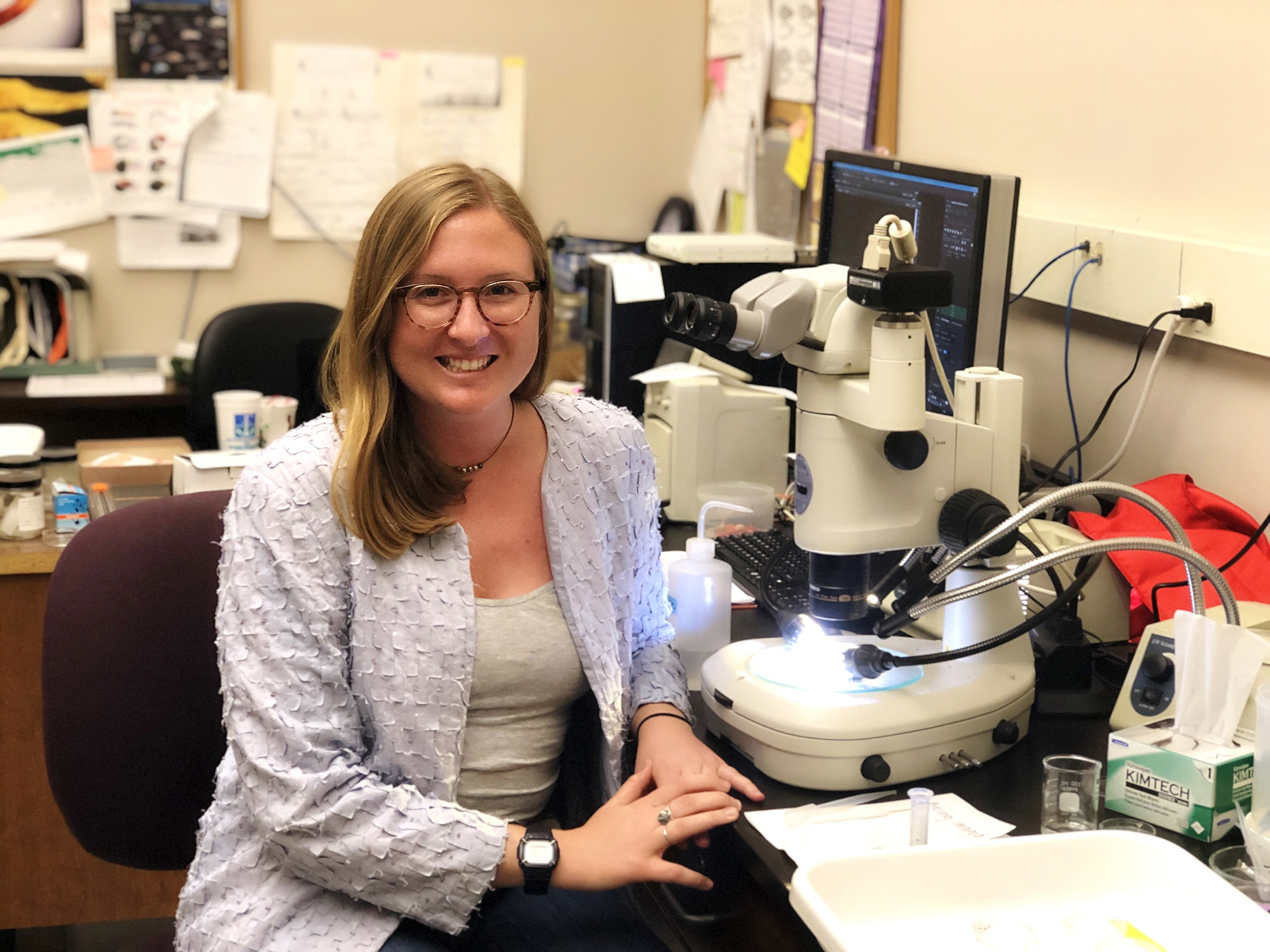
Jessica working in the lab.
Jessica Tolan was a master's student in Dr. Malinda Sutor's lab and a Graduate Research Assistant in the PAST lab working on processing fossil corals for geochemical analysis. Her interests include plankton ecology, water quality, and trophic web dynamics. Her thesis research was on the temporal and spatial trends of dead copepods in the Northern Gulf of Mexico as it relates to the Deepwater Horizon Oil Spill. Jessica is passionate about all aspects of the ocean and loves learning new fields of marine science. Jessica was also Social Chair in the Coast and Environment Graduate Organization (CEGO) (2018–2019) and the Communications Coordinator for LSU Women in Science (2019). Jessica graduated August 2020.
Marissa Vara, Master's of Science degree, 2018
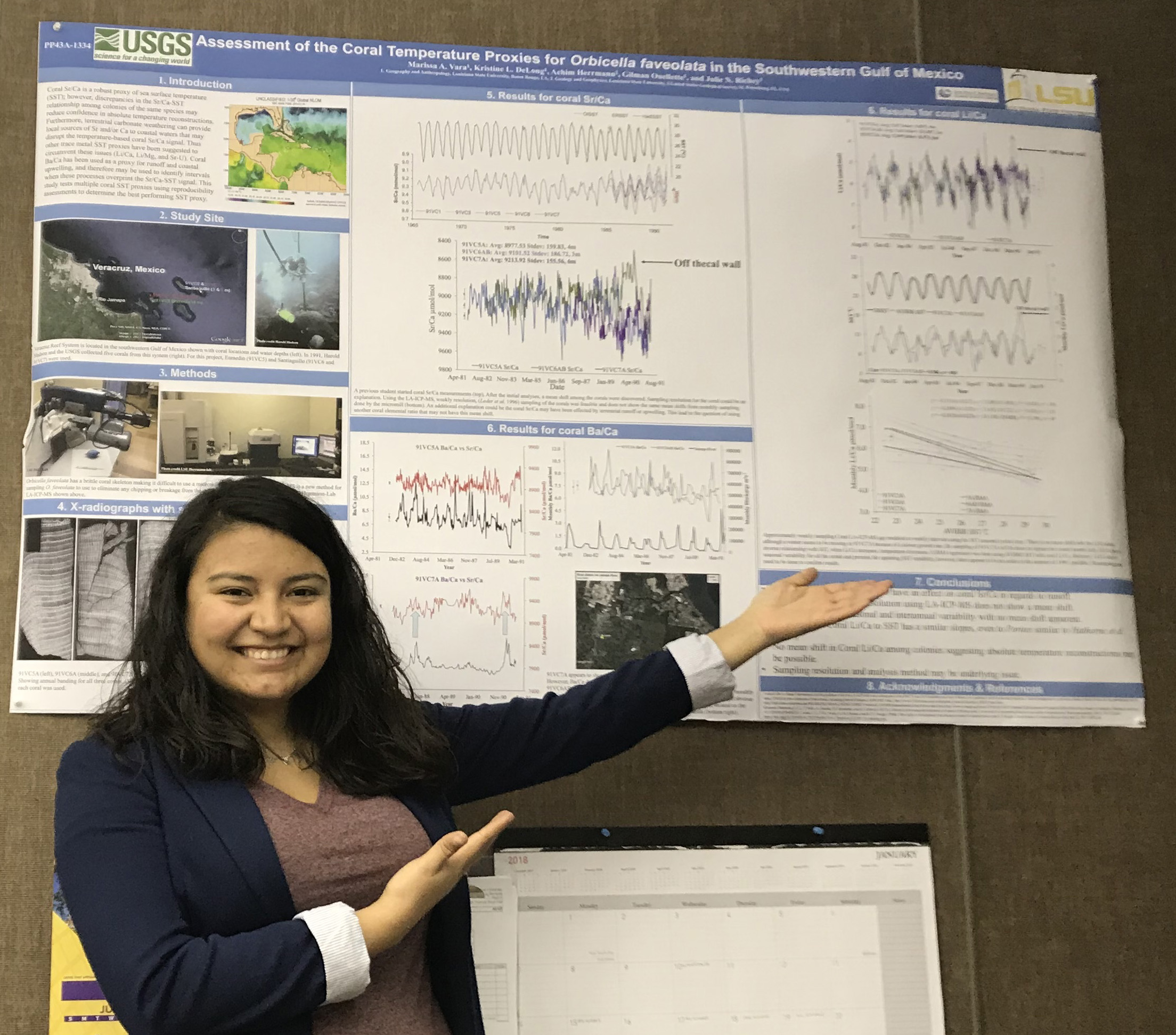
Marissa with her AGU award winning poster.
Marissa's research with corals explored the use of laser-ablation ICP-MS on four Orbicella faveolata corals from two reefs in Veracruz Mexico and assessed several coral proxies (Sr/Ca, Mg/Ca, Li/Ca, Mg/Li, U/Ca, Sr-U, and Ba/Ca) to assess which proxy performed better for reconstructing temperature and river runoff (Ba/Ca). She found coral Li/Ca is the best performing SST proxy followed by Mg/Ca, Mg/Li, Sr/Ca, U/Ca, and Sr-U as determined by error of reconstruction (ºC). Marissa presented her work at the PAGES Open Science meeting in Zaragosa Spain in May 2017, the Ocean Sciences meeting in 2016, and American Geophysical Union Fall Meeting in 2018, where she won the best student poster in Paleoceanography and Paleoclimatology. Marissa enjoys outreach and working with minority students and she now works at the National Science Foundation in their geoscience program.
JT Truong, Master's of Science degree, 2018

JT relaxing after a day on the RV Coastal Profiler.
JT's research program was part of the BOEM funded Alabama underwater forest project where he examined microfossils in the sediment cores collected at the forest site. JT worked with the team to find the unconformity in the sediment cores between the Holocene Sand and late Pleistocene mud and peats sediments using marine microfossils (mostly benthic foraminfera). JT also found intact seeds and small mite in the peats of the cores. JT worked with other students, Suyapa Gonzalez (Geology) and Jeff Obelcz (Oceanography), to build a regional stratigraphic map of the cores and digital elevation model of the forest site. JT presented his work at the Ocean Sciences meeting in 2016 and American Geophysical Union Meeting in 2017. He is now working in the commercial sector.
Gil Ouellette, Ph.D. 2017
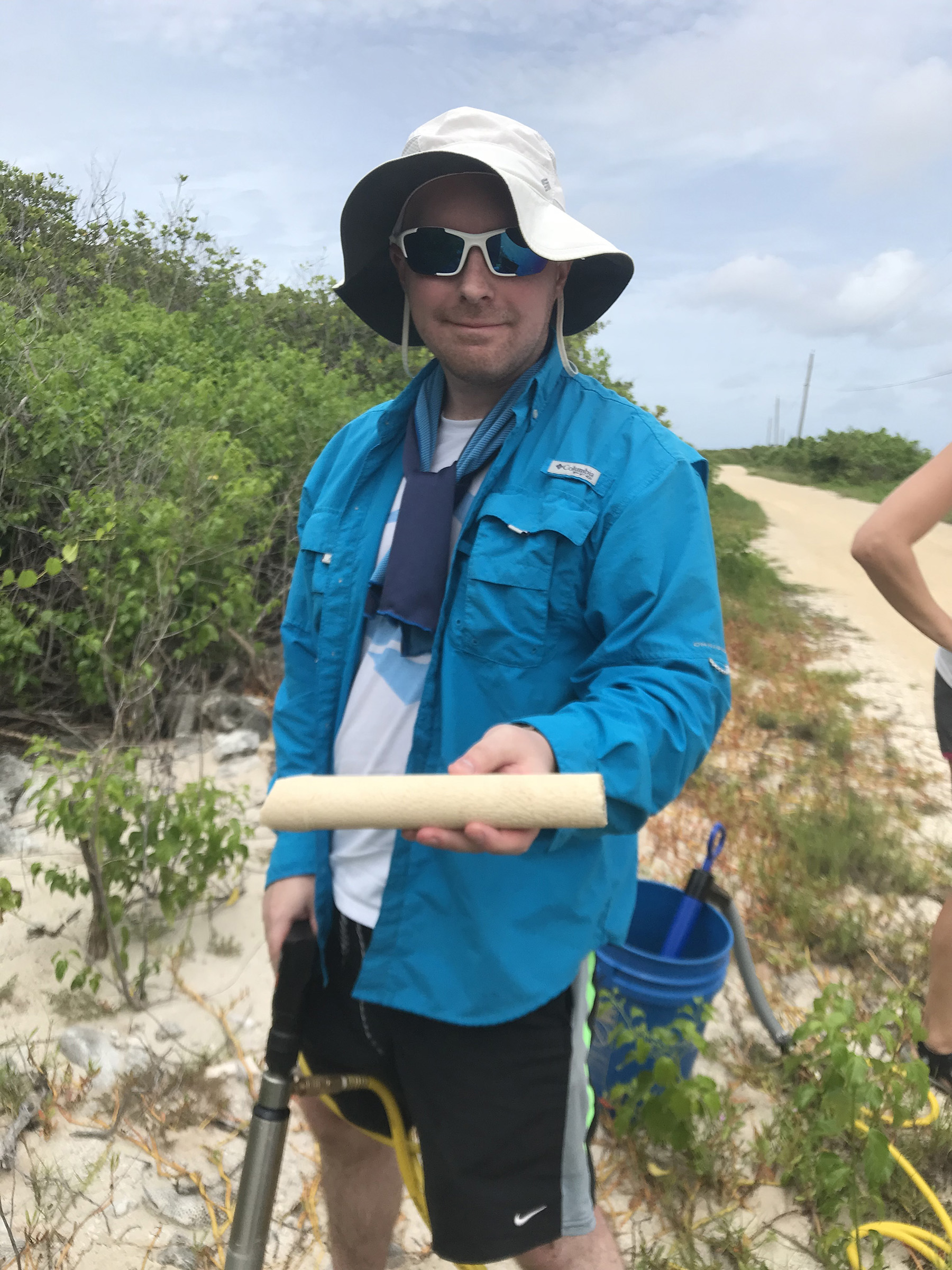
Gil coring in Little Cayman.
Gil's research focused on reconstructing paleoenvironmental conditions in the Haiti and the Caribbean using multiple proxies including coral Sr/Ca and rare earth elements (REE). He produced a coral-based reconstruction of Central Caribbean sea surface temperatures (SST) for the past 50 years for comparison and complimentary use with previous reconstructions of paleoclimatic and paleoceanic conditions in the region. He also examined SST bias among SST data products, in situ SST observations, and coral-based reconstructions. Gil was a visiting student in the HISPEC lab at National Taiwan University for one semester and served as an instructor for two summers at the Central Caribbean Marine Institute in Little Cayman where he mentored undergraduate researchers and taught a course on coral reef ecology. As a masters student at Western Kentucky University, Gil used the oxygen isotope values recorded in calcite stalagmite samples from Barbados to reconstruct precipitation variability over the past 1,500 years. As an undergraduate at the Pennsylvania State University, Gil studied glacial hydrology and climatology. He enjoys exploring caves and interesting places around the Caribbean, as well as exploring the fine chemical and mineralogical structure of samples in the lab. Gil is now at the National Geospatial Intelligence Agency.